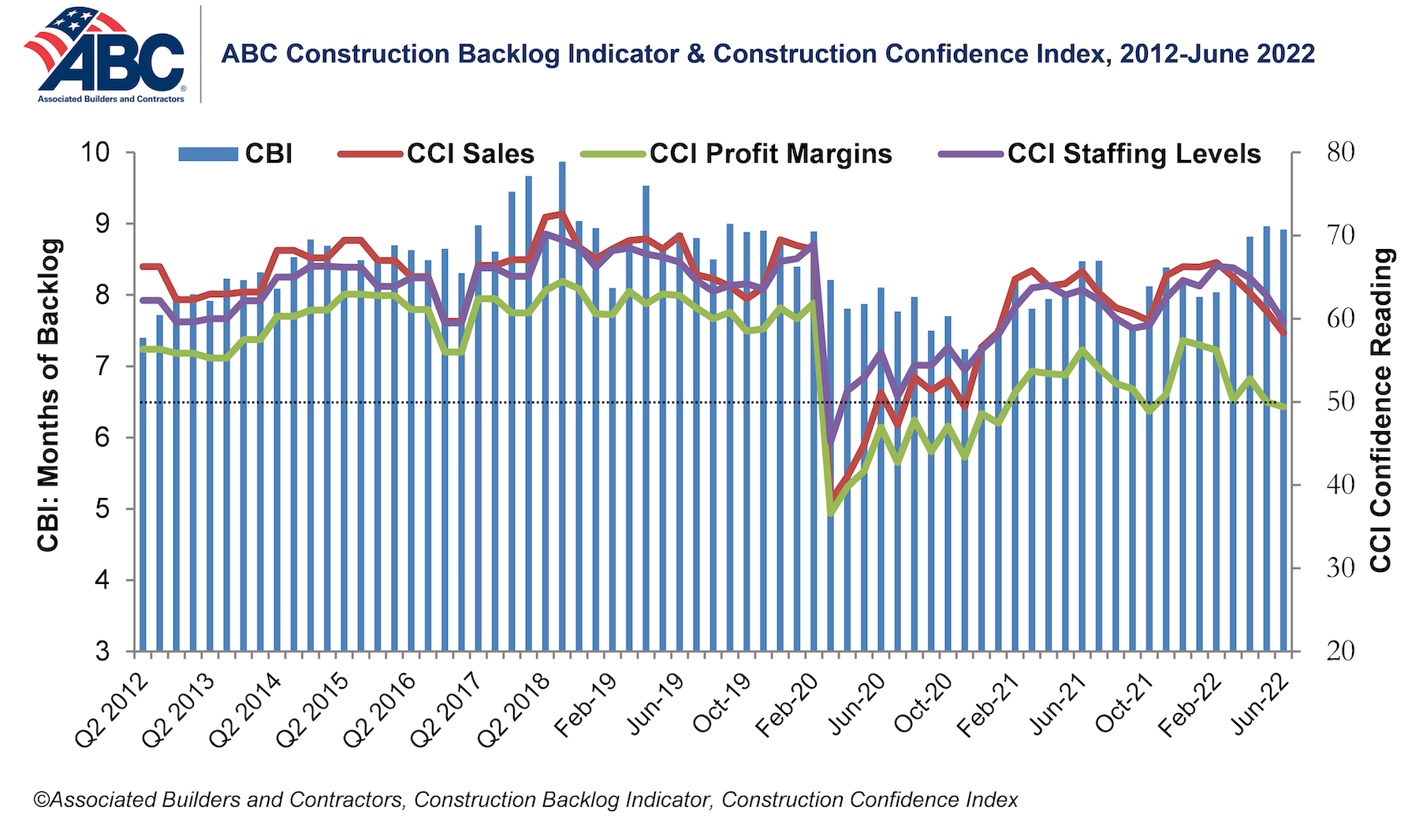Associated Builders and Contractors reports today that its Construction Backlog Indicator fell 0.1 months in June and stands at 8.9 months, according to an ABC member survey conducted June 21 to July 5. The reading is up 0.4 months from June 2021.
View ABC’s Construction Backlog Indicator and Construction Confidence Index tables for June 2022.
ABC’s Construction Confidence Index readings for sales, profit margins and staffing levels declined in June. The indices for sales and staffing remain above the threshold of 50, indicating expectations of growth over the next six months, while the reading for profit margins fell below the threshold of 50 for the first time since October 2021.
“Several months ago, there was conjecture that contractors were generally too upbeat regarding their collective future,” said ABC Chief Economist Anirban Basu. “Increasingly, the data suggest that they were. At the time, many contractors reported surging backlog and an ability to pass along hefty cost increases to project owners. For months, contractors expected sales, employment and margins to expand. The most recent ABC survey indicates that, to secure work and to induce project starts, a growing fraction of contractors is having to trim margins.
“While circumstances are hardly catastrophic, the nonresidential construction marketplace is not as strong as it was expected to be,” said Basu. “Many factors are involved, including materials prices that have remained stubbornly elevated and construction skills shortages that have refused to dissipate.
“In the context of rising fears of recession and rising borrowing costs, the stage has been set for softer nonresidential construction activity going forward," said Basu. "That said, public contractors can expect to remain busy in the context of a significant infrastructure spending package. Still, the market may not prove as robust as anticipated given delayed project start dates as public agencies determine the right moment to purchase construction services. Despite all of these considerations, contractors continue to expect industry sales and employment to expand over the next six months.”

Note: The reference months for the Construction Backlog Indicator and Construction Confidence Index data series were revised on May 12, 2020, to better reflect the survey period. CBI quantifies the previous month’s work under contract based on the latest financials available, while CCI measures contractors’ outlook for the next six months.
Related Stories
Building Team | Jul 30, 2018
Construction tech is the new investment darling for VC funds
In the first half of 2018, venture capital firms invested $1.05 billion in global construction tech startups, setting a record high.
Building Team | Jun 22, 2018
What owners should know before choosing the design-build project delivery method
Outside of drawing up a well-written contract, owners often overlook a key attribute that can significantly impact the success of a design-build project, writes Skanska’s Julie Hyson.
Building Team | Jun 13, 2018
How your AEC firm's brand affects recruiting top talent
There is a major shift in workforce demographics as upwards of 80 million baby boomers retire over the next fifteen years.
Sponsored | | May 24, 2018
Water treatment facility renovation benefits from laser scanning technology
Sponsored | Building Team | May 8, 2018
5 tips to improve employee utilization (and morale)
Ways to increase productivity and revenue, while providing a supportive workplace environment
Architects | Apr 5, 2018
Tech Report 5.0: The Human Touch
Can studying humans at a behavioral level produce better buildings? Cognitive architecture experts are working to find out.
Sponsored | Building Team | Mar 28, 2018
6 strategies to keep your project on budget
Here are six strategies to keep your projects on or even under budget.
Sponsored | | Mar 14, 2018
Getting there may be costing you more
Commercial transportation is getting more expensive, and it’s driving up the price of steel.
Sponsored | Building Team | Dec 12, 2017
3 tips to address the top causes of budget overruns
The most cited issues are communication breakdowns, inadequate fees for the work provided, and unrealistic deadlines or schedules.















